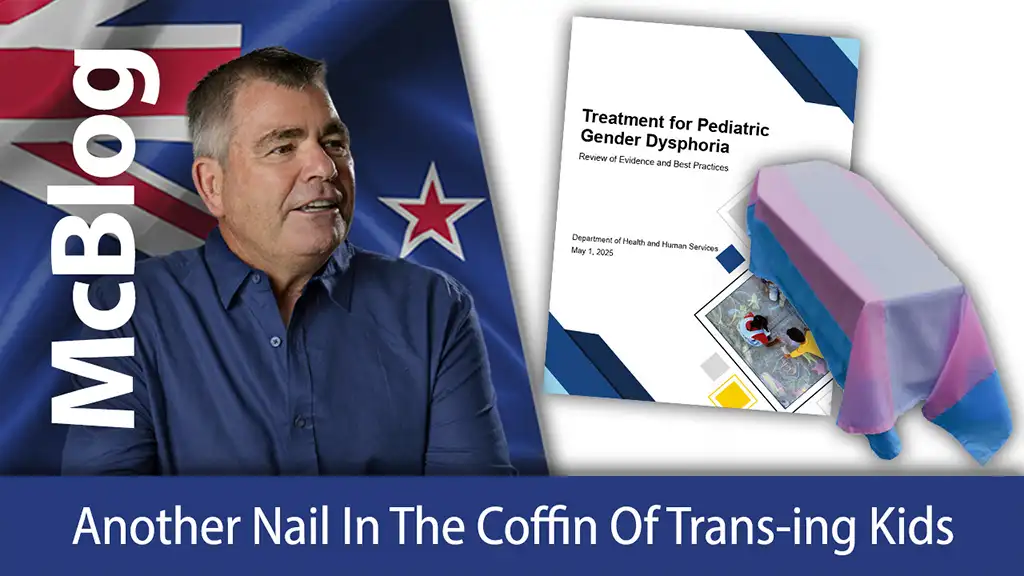In October 2018, Canada was the first G-20 nation to legalise recreational cannabis. Five years on, public health experts say legalisation hasn’t created any health benefits — but it has been linked to some serious concerns. None of the negative outcomes are unexpected. What’s really interesting is who’s now expressing concern.
TRANSCRIPT:
In October 2018, Canada was the first G-20 nation to legalise recreational cannabis. Five years on, public health experts say legalisation hasn’t created any health benefits — but it has been linked to some serious concerns. Harms include increased use, large increase in cannabis poisonings among young children, cannabis hospitalisations, and cannabis-induced psychosis.
The pro-cannabis people like the Greens and Chloe and other activists used to be all over Canada and how great it was. But they have been real quiet in the last week. You probably didn’t even know this report existed. Let’s check it out.
When Canada legalised the use of cannabis in October 2018, the goals were to improve safety and public health as well as to reduce access by youth, reduce crime and the black market. You know – the same stuff we heard during the cannabis referendum here in NZ three years.
Five years later, Canadian public health experts say legalisation hasn’t created any health benefits — but it has been linked to some serious concerns. This is all reported in the latest issue of the Canadian Medical Association Journal .
So let’s check the media coverage first from Canada’s equivalent to TVNZ
I don’t know about you but that sounds like a disaster.
Hospitalisations up – as we predicted would happen in NZ.
Increased use – as we predicted.
Pot related pregnancies – as we predicted.
Kids getting poisoned – as we predicted.
Cannabis induced psychosis – as we predicted.
Increase in ER visits. Mental health problems for youth. Canadian youth have one of the highest rates of cannabis use in the world.
Here’s 2 other recent articles from Canada’s grand experiment
Booming Sales of Legal Marijuana Linked to More Car Crashes
And this one – new study finds Cannabis intoxication and rates of accidental ingestion in young children rise after legalization
A third of active cannabis users still get their cannabis from the black market. Why? Because it’s cheaper, probably stronger, and doesn’t have all the government red tape around it.
Here’s another thing they found out. Going from a couple of cannabis stores in a city to hundreds increased availability, which can lead to overuse problems, said the lead author Daniel Myran.
Wow! Who would have thought that hundreds of outlets selling drugs would increase use and abuse. Doh!
The lead author said: “Our data, while not conclusive, is hinting that as the market expands, when you see greater levels of market maturity, new products, that you do see these increases in cannabis harms.”
Here’s another article that was released just a couple of days ago
“The razzle-dazzle days where money was no object and sky-high demand was expected are gone, replaced by a sobering reality: legalisation has fallen well short of expectations.
The biggest companies — Canopy Growth Corp., Aurora Cannabis Inc. and Tilray Brands Inc. — have shrunk their footprints, laid off thousands and grappled with balance sheets that reflect a turbulent market and a longer march to profitability than many once imagined.
Others weren’t so lucky. They sold their business at bargain prices to a bigger rival, folded or declared bankruptcy.”
You’ll see one of the “experts’ was Benedickt Fisher who said of the results – it “wasn’t expected”.
Anybody – everybody – except the drug advocates know this was the outcome.
Here’s the interesting bit
Benedickt Fisher is from Auckland University and also Simon Fraser University in Vancouver. He was on the expert panel for the referendum (circled there). Back in 2019 Jacinda Ardern asked the Chief Science Advisor to provide an accessible summary of the evidence to inform the cannabis referendum, using an ‘expert’ panel. The ‘expert’ panel was charged with pulling together as much information as they could about the impacts of cannabis, and to present it in a way that is easy to understand for voters.
The problem was that of the 10 members of the ‘expert’ panel, SEVEN had declared that they support legalisation of cannabis – and not even one of the panel had expressed opposition.
That’s how Jacinda solved problems. Pick stacked committees which agree with her.
A couple of months after the NO vote won the referendum – and you can still hear the wailing from the Yes campaign – Benedikt was back.
An article appeared in the The Lancet Regional Health – Western Pacific entitled New Zealand’s failed cannabis legalization referendum – implications for cannabis policy reform.
In a short analysis, it concludes:
“Governments and lawmakers, rather, will need to develop and move forward reform initiatives in their respective political systems and demonstrate leadership and courage in persuading their citizens that cannabis legalization is a desirable and valid policy direction.”
An atrocious piece. Ignore the people – only governments and lawmakers should have a say. The public are too dumb. IMAGE
Helen Clark made these same claims.
She said “It’s an issue where a party should do its research and come up with a proposal.”
Uh – well, they did. And the majority said no.
But as I said, they’re still whining about losing the referendum.
Now the ONLY benefit the commentators could point to was fewer arrests and so-called “social justice”. Well, once again, of course there were fewer arrests. An illegal product was made legal.
Is this why they call cannabis “dope”? These people aren’t very smart connecting the dots, are they.
The so-called “experts” say it wasn’t expected. Of course it was. Don’t listen to the experts.
Canadian doctors want it treated like tobacco – and how are we treating tobacco?
Smokefree 2025.
The good news for NZ is that as we watch the disaster of legalisation of cannabis in Canada and Colorado and every other state that goes down this dopey track, the more concrete evidence we get that confirms that NZers made the very best decision in 2020 by voting no.



